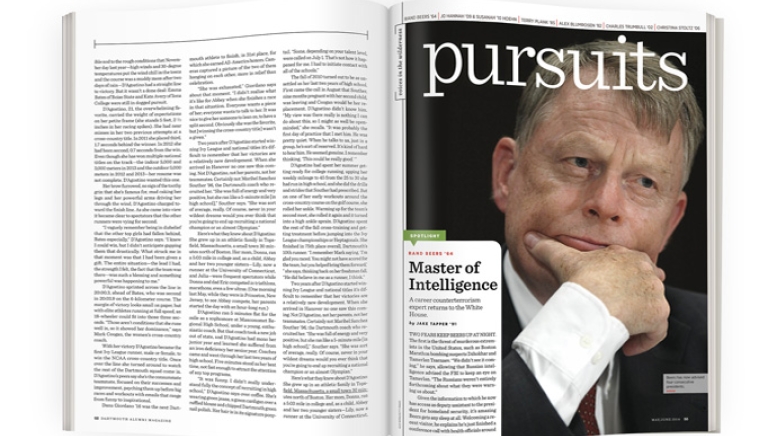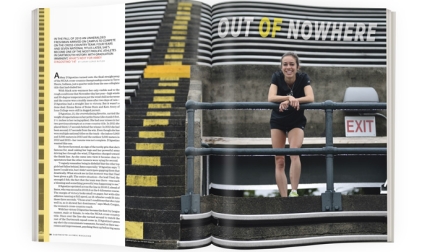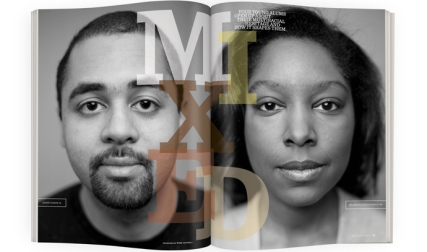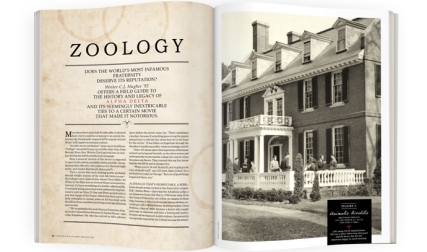Rand Beers ’64
Master of Intelligence
A career counterterrorism expert returns to the White House.
Two fears keep Beers up at night. The first is the threat of murderous extremists in the United States, such as Boston Marathon bombing suspects Dzhokhar and Tamerlan Tsarnaev. “We didn’t see it coming,” he says, allowing that Russian intelligence advised the FBI to keep an eye on Tamerlan. “The Russians weren’t entirely forthcoming about what they were warning us about.”
Given the information to which he now has access as deputy assistant to the president for homeland security, it’s amazing Beers gets any sleep at all. Welcoming a recent visitor, he explains he’s just finished a conference call with health officials around the world to discuss pandemics—one of many threats he must monitor. Sitting at his desk, he nods toward his computer: “The screen in front of me is full of unclassified information, but I can press a button and it becomes classified. All of a sudden I’m in a top secret information system—the entire range of classified information available on the Internet—pretty much everything.” At the U.S. Department of Homeland Security he would need to go to another room to access classified information or depend on others to bring him items. Working for the president, it’s all a mouse click away.
The second concern keeping Beers awake at night involves cybersecurity. “Americans are at risk from criminals seeking to steal their personal information to make money,” he says. This will continue to get worse, he predicts, and beyond that is the potential for cyberwar and cyberattacks.
In a way Beers has been confronting threats since he left Hanover. The Washingtonian attended Dartmouth as part of Navy ROTC, and after graduation was commissioned as a Marine. From May 1966 until January 1968 he was in Vietnam, the last half year as a rifle company commander. “I got shot at the whole time I was there, but I was only in a shooting situation the last six months,” he says. After graduate school in military history at the University of Michigan he entered the foreign service, where he spent 12 years.
This is not Beers’ first tour in the White House. He served on the U.S. National Security Council staff under President George H.W. Bush as director for counterterrorism and counternarcotics, under President Bill Clinton as director for peacekeeping and then as special assistant to the president and senior director for intelligence programs. President George W. Bush appointed him special assistant and senior director for combating terrorism, but that ended when Beers, an opponent of the decision to invade Iraq, decided he could not in good conscience continue serving in that role. After dropping out he worked on the 2004 campaign of John Kerry and was ultimately brought back into government via Team Obama.
“The health issue is just one of a number of issues I deal with,” Beers tells DAM, rattling off a list that includes Mexico and drug trafficking, immigration and the government’s emergency response to, say, February snowstorms. And although he won’t be quoted talking about Edward Snowden or the National Security Agency surveillance programs Snowden brought to the public’s attention, Beers isn’t displeased with the fact that society is debating surveillance and the general subject of liberty versus security. “Our national security comes from the people who do it, from the private, first class, in Afghanistan to the border patrol agent in Arizona to the president,” Beers says. “They merit the support and respect of the American people.”
—Jake Tapper
Jo Hannah Hoehn ’09 & Susanah Hoehn ’10
Sibling Revelry
For most people, driving from Paris to Morocco without a GPS or cellphone would be a nightmare. But to Susanah and Jo Hannah, it sounded “like the adventure of a lifetime.” For nine days in March the sisters participated in the 24th Rallye Aïcha des Gazelles. This all-female, off-road rally attracts more than 300 competitors from more than 20 countries who must use old-school navigation techniques—and no service crews—to find the most direct route to checkpoints in the Sahara.
The event was a natural fit for the Hoehns, fourth-generation car dealers from San Diego. Art history major Jo Hannah drove, while Susanah, a classical studies major, navigated the 1,700-mile journey. They trained with a professional off-road racer in the southern California desert, Susanah says, driving, camping out and working on “basic navigational training, learning how to analyze topographical maps and to use a Breton plotter, minute ruler and compass to plot checkpoints and take bearings.” One of the most difficult aspects of training for Jo Hannah was “learning the difference between ‘normal’ and ‘harmful’ car sounds,” she says. There was also the matter of driving in different terrains. “In rocky, mountainous areas the main challenge is positioning the wheels in a way that will best protect the tires,” Susanah says. “In sand dunes we deflate the air in our tires to gain more surface area on the ground and concentrate on keeping a steady momentum so as not to get stuck.” Team 107 handily hit all the rally checkpoints of the first week, but on the second-to-last day the pair came off a steep dune and broke the radiator mounts on their SUV. They didn’t make the final stage, but did manage to drive into Essaouira, Morocco, to celebrate the completion of their first Gazelle rally.
—Bonnie Barber
Terry Plank ’85
Rare Earth
Plank grew up in a house that was built on a Wilmington, Delaware, schist quarry, and as a third-grader she was the youngest member of the Delaware Mineralogical Society. So it’s not surprising that her interest in rocks and minerals led to a career as a geochemist. Now she may take rock collecting to a whole new level, thanks to a $500,000 MacArthur Fellowship “Genius Grant.”
A researcher at Columbia University’s Lamont-Doherty Earth Observatory, she is still mulling how to use the “no-strings-attached” MacArthur money she was awarded in 2012. “It has mostly caused a lot of soul-searching,” says Plank, who is known for her research on how plate tectonics influence volcanoes. Most recently she’s been trying to figure out why Hawaii’s once-explosive Kilauea volcano has been erupting so quietly since the 1950s, but she’d like to “do something different in my research because all the discoveries in our field have come just from collecting data.” As someone who studied the granite of New Hampshire as an undergraduate and now studies Manhattan schist with her Columbia students, she believes a lot of useful data can be gleaned from studying the old rocks of the continents.
“We haven’t really brought all the analytical tools to bear to study the rocks beneath our feet,” she says. “That’s what I’m most interested in doing—sampling the continent to find out what these rocks can tell us about when mountains formed, when they eroded and when the plates came together and came apart. There’s a story in there, a story about the last billion years of earth’s history.”
—Bonnie Barber
Alex Blumrosen ’82
Monument Man
Blumrosen was accompanying his daughter on a Girl Scout field trip in Paris when he stumbled upon the Lafayette Escadrille Memorial. The WW I monument honors 38 American fighter pilots—including several Dartmouth alumni—who fought with the French Air Service in 1916, before the United States had officially entered the war. The memorial was badly in need of renovations, largely forgotten in a country that is long on war monuments but short on the government funds needed to preserve them. Blumrosen, a New Jersey native who has spent the past 25 years working as an attorney in Paris, took an interest in the Lafayette Escadrille, and launched a campaign to bring the memorial back to its former glory.
The project is a marked change from Blumrosen’s day job as an international arbitration lawyer, where his practice focuses on helping American companies and public-sector agencies such as the U.S. Department of Justice navigate the cultural and legal divides between the U.S. and French systems. He sees his interest in the Lafayette Escadrille as a natural extension of the passion for French-American cultural exchange that he has developed since adolescence, first as a student in a Swiss boarding school and later as a French teaching assistant for professor John Rassias. “It’s not legal work exactly,” says Blumrosen, who is now president of the foundation that owns the memorial. “But it is part of getting France and the United States to communicate so that issues of contention—in this case, the renovation of a memorial—can be resolved.”
His efforts are now starting to pay off. In February the U.S. and French governments announced plans to raise 6 million euros (roughly $8 million) to help restore the Lafayette Escadrille in time for the WW I squadron’s centennial anniversary in 2016. “Finally it looks like the stars are aligned to make this work,” says Blumrosen.
—Grace Wyler ’09
Charles Trumbull ’02
Eye On Cuba
There are 154 detainees in Guantanamo Bay. Trumbull is determined to bring the number down to zero.
As deputy in the U.S. State Department’s Office of the Special Envoy for Guantanamo Closure, Trumbull and his colleagues are responsible for carrying out a mandate by President Barack Obama to close the detention center. In December 2013 Trumbull’s office transferred nine detainees back to their home countries or resettled them in other countries. There are 77 more detainees currently approved for transfers, he says, and the challenge will be finding places to send them. For each detainee, Trumbull and his team must navigate a number of restrictions imposed by Congress. His office must also negotiate appropriate security and humane treatment assurances with the receiving countries.
Further limiting transfer efforts, Congress has barred any detainees from being moved to the United States. “This transfer of nine detainees was very important, because from the beginning of 2010 until this past summer we transferred only four detainees out of Guantanamo,” says Trumbull. “We’re making significant progress now, and we’ll build on that progress throughout this year.” Trumbull began serving as the deputy special envoy last October, though his relationship with Cuba extends back to his sophomore year of high school, when he was first exposed to the country through a Rotary Exchange trip to Central America. “My trips to Cuba reaffirmed my interest in studying other countries around the world and foreign relations,” he says.
—Gavin Huang ’14
Christina Stoltz ’06, Adv’07
Recovering Balance
Stoltz draws on her own experiences to find support and healing for more than 400 survivors of sexual violence and human trafficking through sister enterprises Ploome and REQ.1. An activist since her time at Dartmouth, Stoltz worked as a translator in human trafficking shelters in Russia and as a victim advocate in Kyrgyzstan. There she was brutally assaulted by a gang of men and then survived an abduction attempt—experiences that led her to develop a fitness and arts program for herself that became the basis of REQ.1. “I clung to movement, writing and art as methods to overcome my despair,” she tells DAM. “With effort, support and time I grew strong, empowered and inspired.”
For-profit fitness studio Ploome provides the funding and programming for nonprofit REQ.1. “Fitness is a powerful metaphor for change and speaks to the heart of the REQ.1 and Ploome community,” says Stoltz. “When your body feels capable and your mind is at ease, you remember that you have control over all other aspects of your life as well.”
Stoltz helps survivors of gender-based violence through REQ.1, with such programs as the popular Victory Kicks, where women exercise in recycled track shoes before transforming them into an art project that incorporates paintings of personal healing. As a final step the shoes are filled with flowers as a reminder that “the process of healing is long but beautiful,” she says. Although fitness is an important healing component for Stoltz, she encourages trauma survivors to honor their feelings and begin the process of healing that works for them: “There is no denying it, your world will never be the same. But the good news is your world can even be better, brighter and bigger than before.”
—Minae Seog ’14




